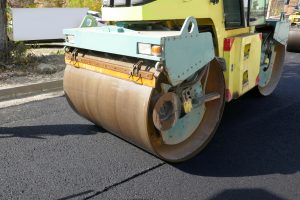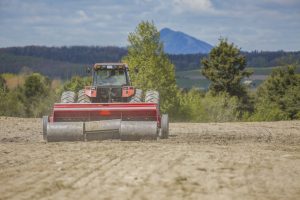Introduction to Land Rollers for Compact Tractors
For farmers and agricultural professionals using compact tractors, land rollers are an essential tool for achieving optimal field conditions. These versatile implements play a crucial role in soil preparation, seedbed creation, and overall field maintenance, ultimately enhancing crop growth and harvesting efficiency.

Benefits of Using Land Rollers in Field Work
Land rollers offer numerous advantages that streamline field work and improve productivity. Here are some key benefits of incorporating a land roller into your compact tractor operations:
- Soil Compaction: Rollers help compact and firm the soil, creating a smooth, level surface ideal for planting. This compaction ensures good seed-to-soil contact, promoting better germination and root establishment.
- Seedbed Preparation: By breaking up clods and smoothing the soil surface, land rollers create an ideal seedbed for planting. This uniform seedbed allows for consistent seed depth and spacing, contributing to even crop growth.
- Improved Field Smoothness: Rolling fields after planting or harvesting helps eliminate ruts, ridges, and other surface irregularities. A smooth field surface facilitates easier and more efficient equipment operation, reducing wear and tear on machinery.
- Increased Water Infiltration: Compacted soil allows for better water infiltration and retention, reducing runoff and ensuring more efficient use of irrigation or rainfall.
Types of Land Rollers for Compact Tractors
Land rollers come in various designs to meet different field conditions and agricultural needs. Here are some common types of land rollers suitable for compact tractors:
- Smooth Rollers: These rollers feature a smooth surface and are ideal for general soil compaction and smoothing tasks, particularly in well-tilled or loamy soils.
- Corrugated Rollers: With their ridged surface, corrugated rollers are effective at breaking up clods and providing a firm seedbed in heavier or rougher soil conditions.
- Drum Rollers: Consisting of multiple cylindrical drums, these rollers are designed for more aggressive compaction and smoothing, making them suitable for use in fields with harder or more compacted soil.
Choosing the Right Land Roller for Your Needs
To ensure optimal performance and efficiency, it’s essential to select the most appropriate land roller for your specific field conditions and requirements. Consider factors such as field size, soil type, and the tasks you need to accomplish. For example, smaller fields with lighter soils may benefit from a smooth roller, while larger fields with heavier soils might require a corrugated or drum roller for better soil preparation.
How to Maintain Your Land Roller Proper maintenance is key to ensuring the longevity and optimal performance of your land roller. Follow these best practices:
- Clean the roller regularly to remove accumulated soil and debris, preventing rust and maintaining smooth operation.
- Lubricate moving parts according to manufacturer recommendations to minimise wear and tear.
- Inspect the roller periodically for any signs of damage or excessive wear, and replace components as needed.
Frequently Asked Questions About Land Rollers
Q: What are land rollers and why are they important for field work?
A: Land rollers are agricultural implements used to compact and smooth soil surfaces, preparing ideal seedbeds and improving overall field conditions for efficient planting, crop growth, and harvesting.
Q: How do land rollers benefit compact tractor users?
A: Land rollers help compact and level the soil, create optimal seedbeds, improve water infiltration, and eliminate surface irregularities, making field work more efficient and productive for compact tractor users.
Q: What types of land rollers are available for compact tractors?
A: Common types of land rollers for compact tractors include smooth rollers, corrugated rollers, and drum rollers, each designed for specific soil conditions and agricultural tasks.
Q: How do you choose the right land roller for specific field conditions?
A: Consider factors like field size, soil type, and the specific tasks you need to accomplish. For example, smooth rollers are suitable for well-tilled or loamy soils, while corrugated or drum rollers are better for heavier or more compacted soil conditions.
Q: What are the best practices for maintaining a land roller?
A: Regular cleaning, lubrication of moving parts, and periodic inspections for wear and damage are essential for maintaining the longevity and performance of your land roller.
Land rollers are invaluable tools for compact tractor users, offering numerous benefits that enhance field work efficiency and productivity. By understanding the different types of land rollers, their specific applications, and how to choose the right one for your needs, you can ensure optimal soil preparation, seedbed creation, and overall field maintenance. With proper maintenance, a high-quality land roller can be a long-lasting investment that pays dividends in improved crop yields and streamlined agricultural operations.
Choose Blacktrac Compactors today!
Experience the Power of Blacktrac Compactors for Your Compact Tractor Needs! Maximise your field work efficiency with our top-of-the-line land rollers and compactors, specifically designed for compact tractors. From smooth rollers to corrugated and drum rollers, we have the perfect solution to prepare your soil, create ideal seedbeds, and ensure a level surface for optimal crop growth. Don’t settle for less – contact Blacktrac today and let our experts guide you in selecting the right compactor or land roller to take your agricultural productivity to new heights! Contact us today!

